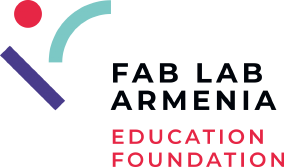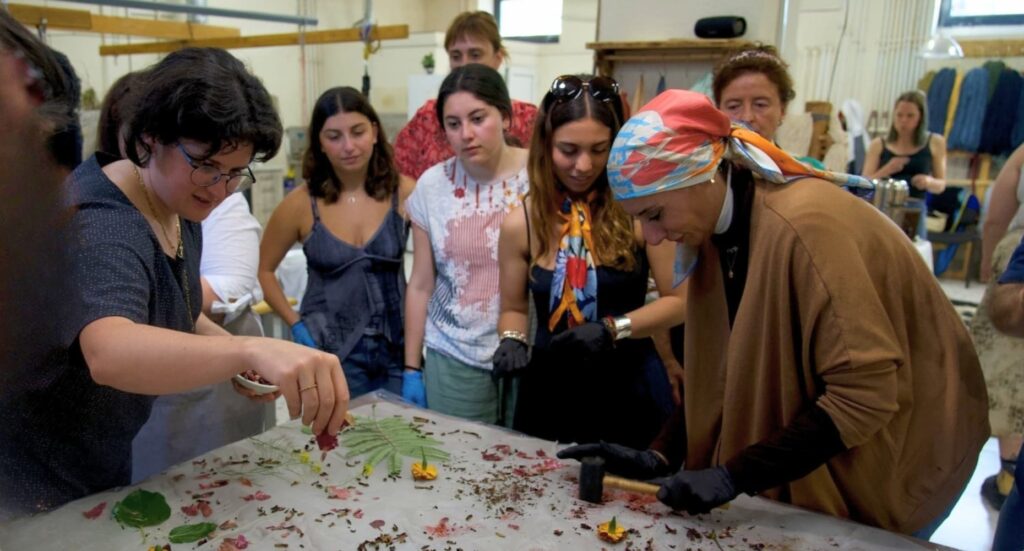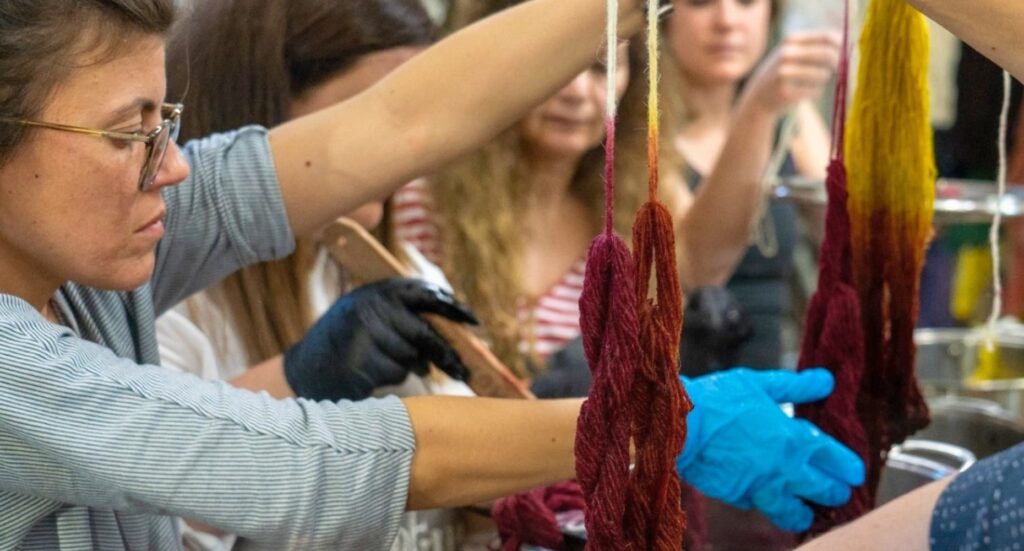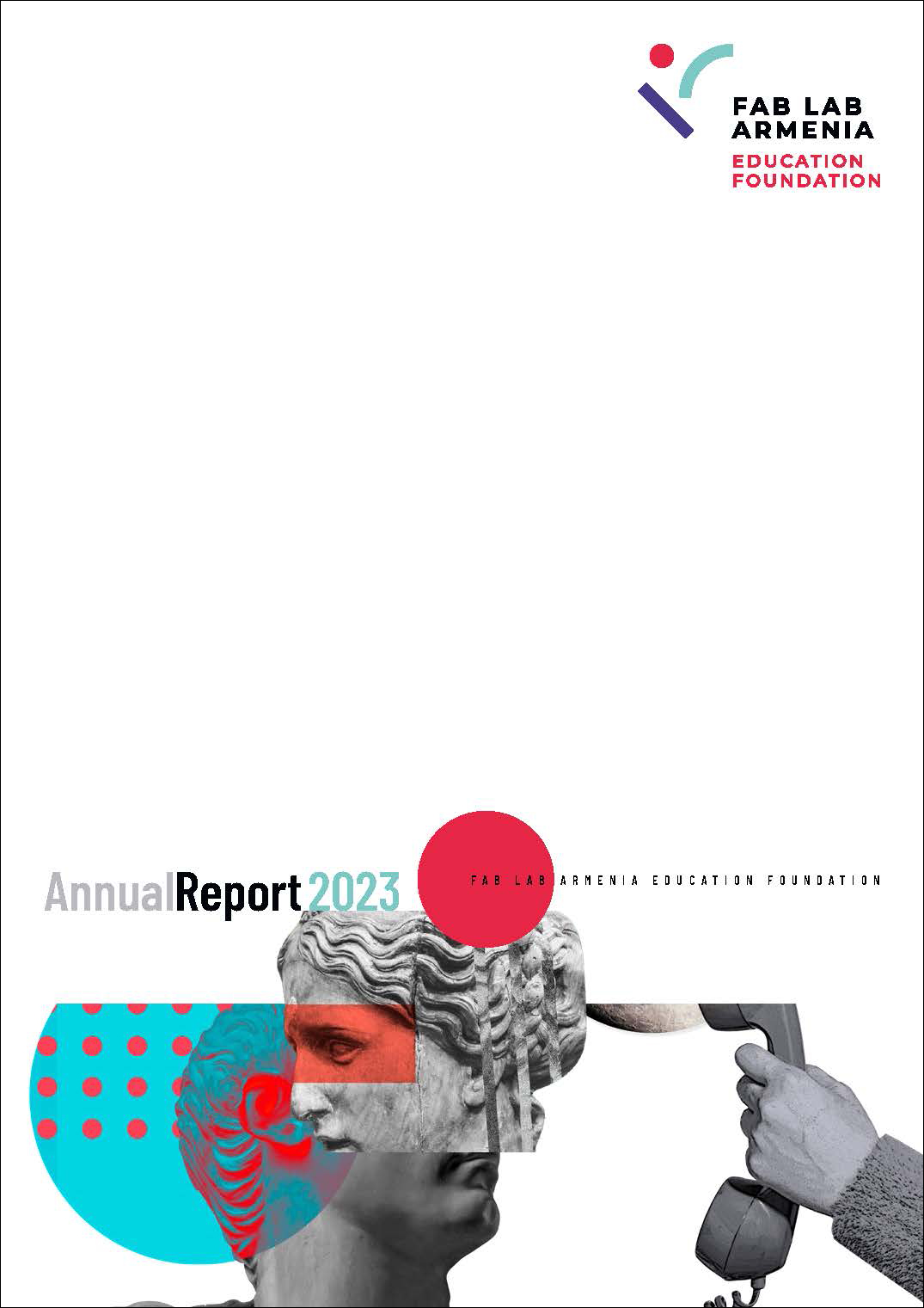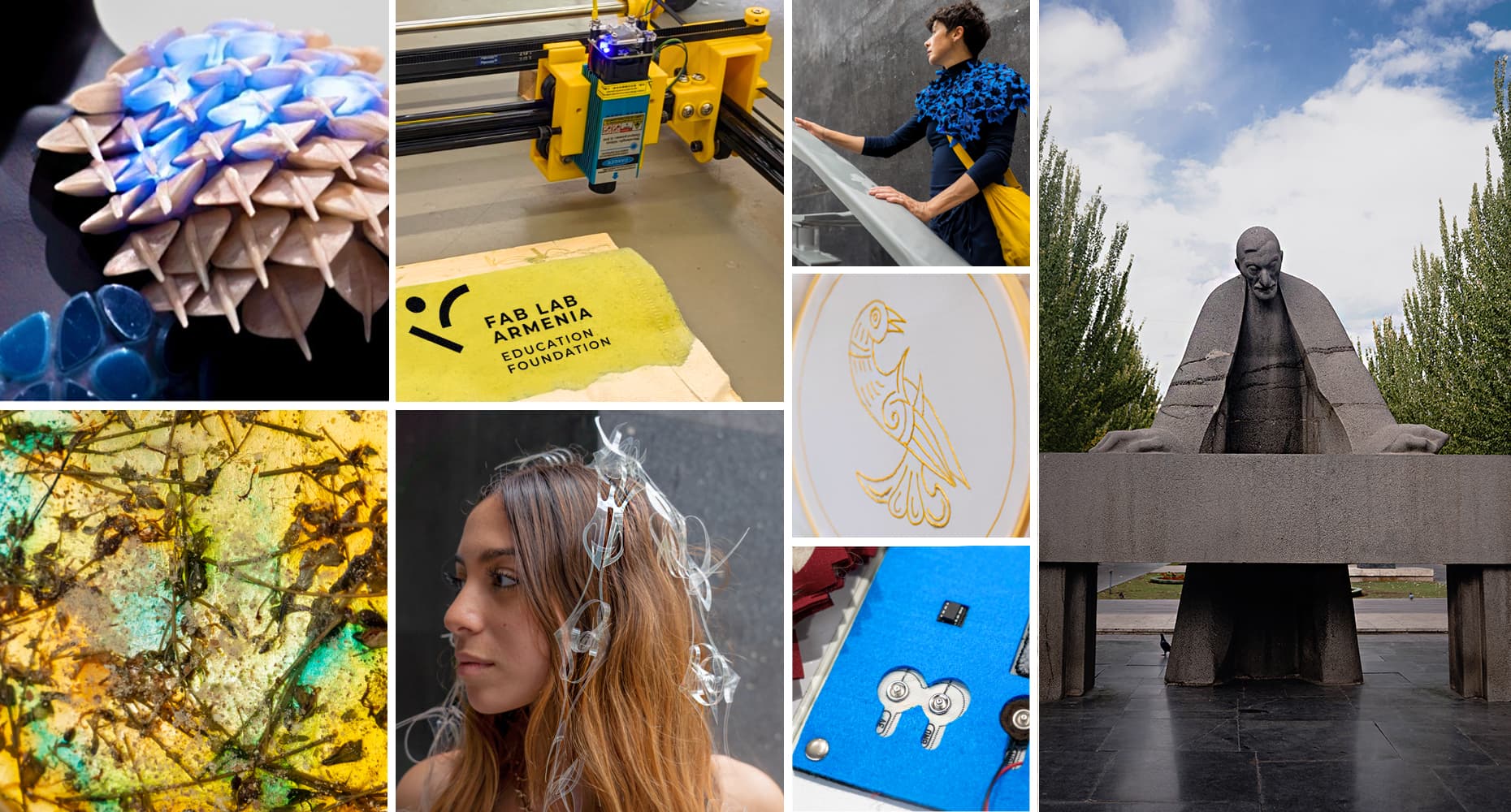
Fabricademy Bootcamp Armenia: Creativity and Innovation in Action
This summer, the Fab Lab Armenia Foundation, in collaboration with the AGBU Katapult Creative Accelerator, hosted Anastasia Pistofidou and the Fabricademy Bootcamp participants from May 26 to June 1, 2024, in Armenia. Anastasia, an expert in digital fabrication, bio-fabrication, textiles, and wearable technologies, is the co-founder of Fabricademy and its annual Bootcamp. Now in its eighth year, the Fabricademy Bootcamp takes place in a different country each year, gathering experts and novices from diverse backgrounds, ages, and nationalities. Participants exchange best practices and embark on a journey of exploration and discovery at the intersection of traditional crafts, arts, sciences, and new technologies. The Bootcamp also serves as a one-week intensive introduction to the emerging e-textiles industry, where electronics, sensors, and programming are integrated with textiles, showcasing their wide range of applications in everyday life.
The Fabricademy Bootcamp Armenia blossomed into a new beginning, igniting inspiration, creativity, and a wealth of new knowledge; hosted by Fab Lab Armenia, it was an immersive experience throughout the week where participants from over a dozen countries explored the exciting interrelations between textiles, digital fabrication, and sustainability. The journey through Armenia enriched the mosaic of cultural and technological discovery, setting the stage for the highly anticipated Fabricademy scheduled for September 2024.
A Week of Exploration and Learning
The Bootcamp commenced on May 26, 2024, in Yerevan, the heart of Armenia. It offered a week-long dynamic blend of tours and hands-on workshops for the participants. The Katapult Creative Accelerator team welcomed the workshop participants at AGBU and fostered a vibrant environment for discussions, focusing on sustainable textile practices and digital fabrication technologies.
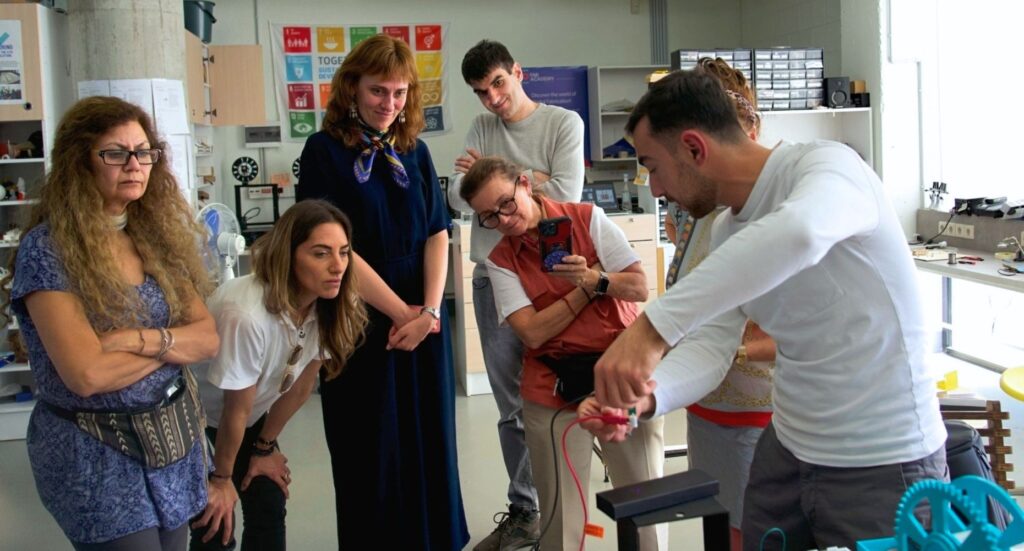
When the group visited the Lusik Aguletsi Museum, the deep cultural heritage of Armenia was overwhelming and served as an intense backdrop for further creative activities.
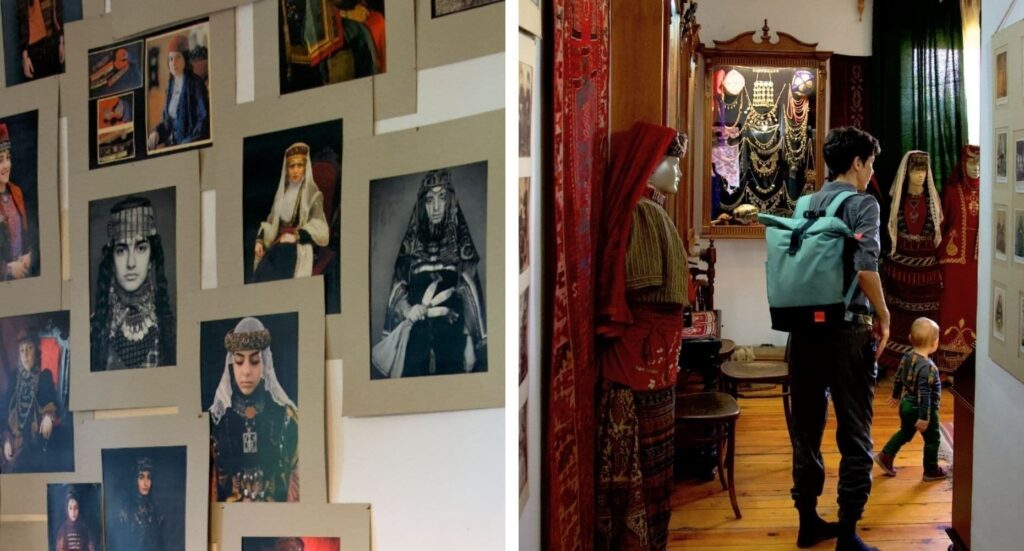
Workshop Focal Points
1. Natural Dyes and Sustainable Practices
The first two workshops were held at the Silk Road Hotel, where participants explored traditional Armenian crafts under the guidance of local experts. They learned the art of felt making by crafting delicate felt balls and engaged in the intricate process of Armenian carpet weaving. These workshops were crucial in immersing participants in the rich tradition of Armenian carpet weaving, a craft of profound cultural significance. Often referred to as ‘talking carpets,’ these woven masterpieces serve as repositories of cultural narratives and historical memory. Each intricate pattern carries centuries-old stories and valuable information, passed down through generations.
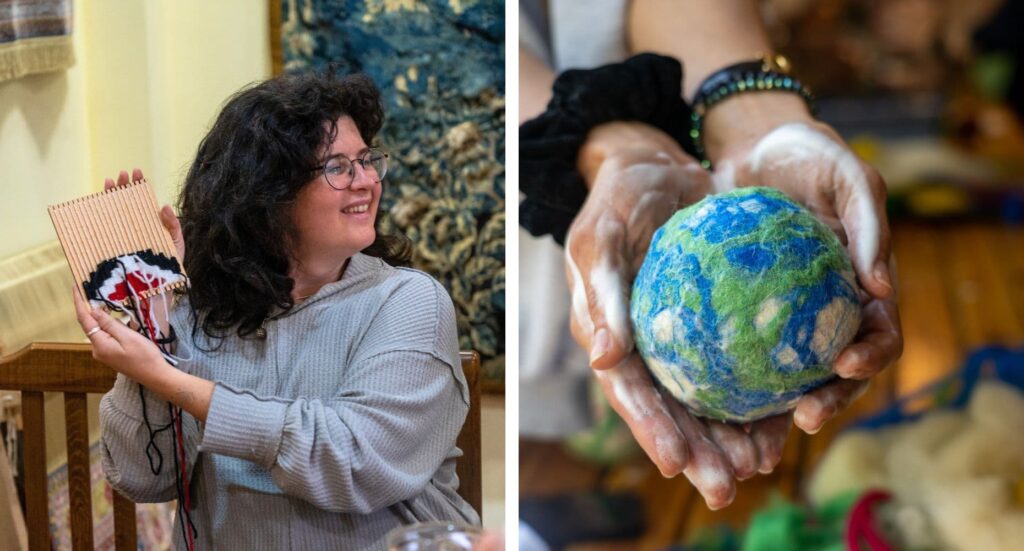
At the top of the list of memorable workshops in Yerevan, was the natural wool dyeing session hosted by Woolway Studios. The studio’s commitment to eco-friendly textile practices and artisanal craftsmanship was eye-opening. Woolway Studios prioritizes the use of naturally sourced yarns, placing a strong emphasis on sustainability. Participants learned techniques for using plants to create sustainable dyes and threads, showcasing how nature-inspired solutions can revolutionize textile production.
“The natural wool-dyeing workshop at Woolway Studios was such an awakening experience. Coming right back home, I started to run personal experiments with the yarrow flower, to create natural dyes and threads. Yarrow is a plant that grows in the wild and almost anywhere. This experience changed how I think about sustainable textile practices.“
— Silvia Brandi, Fabricademy Bootcamp Participant
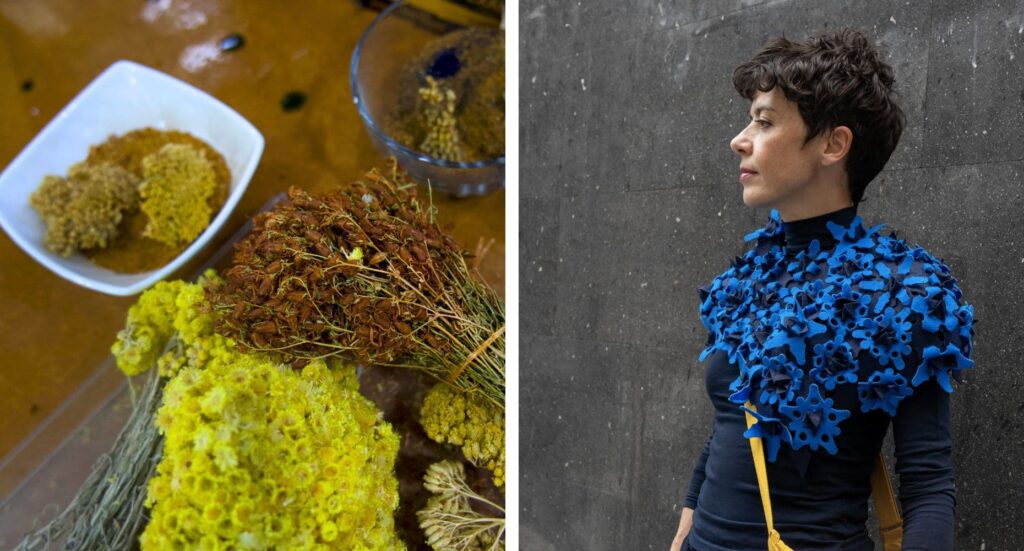
2. Crafting Creativity: Hands-On in Dilijan’s Fab Lab
The trip to Dilijan, home to the Fab Lab Armenia Education Foundation, was an immersive experience in learning about digital design and fabrication and how blend digital fabrication techniques and tools with traditional artisanal crafts and across various domains of the arts and crafts.
3D Printing Fabrics: Innovative uses joining tech and fabric were demonstrated by Anastasia Pistofidou in her presentation involving 3D printed fabrics.
- Circular Fashion: Claudia Simonelli’s lecture on circular fashion highlighted sustainable practices and creative approaches to reshaping the industry, followed by a hands-on session applying these principles.
- Leather Crafting and Biomaterials: The hands-on workshops featured experiments with leather molding and innovative biomaterial projects, such as producing bacterial cellulose from kombucha SCOBY, pushing the boundaries of sustainable innovation.
- The E-Textiles and OS Machines: On the last day in Dilijan, Emma Pareschi held a workshop that explored the merging of electronic technology with textiles; Babken Chugaszyan then talked about OS machines while Mkhitar Evoyan, together with the FLA team, showcased the ARPI UV machine with its inventive UV laser module technology.
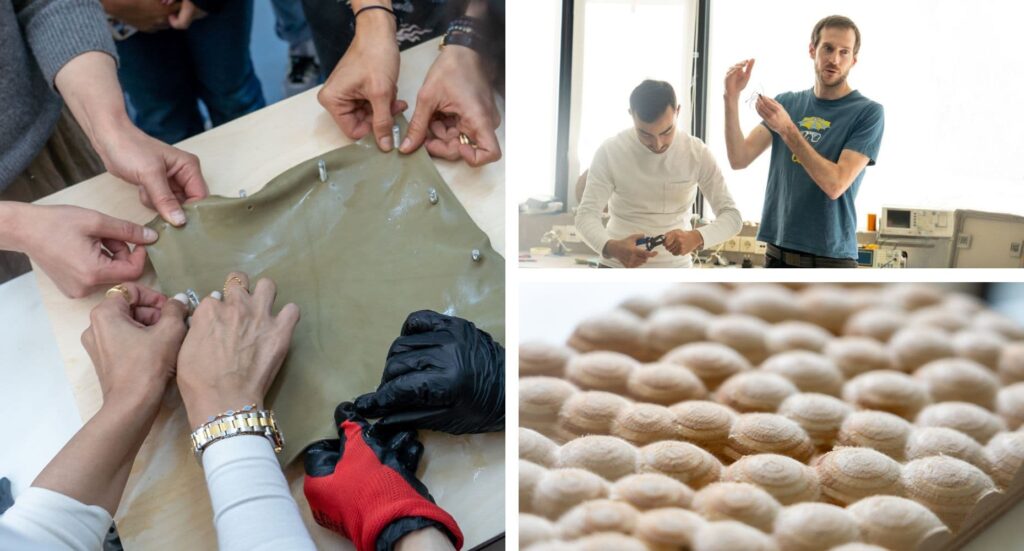
3. Community Involvement
FLA opened its doors in the afternoon to community members, including Dilijan school children, DSC teachers, and students. They were able to see works designed by Bootcamp participants and engage in conversations. Anoush Arshakyan took all participants and visitors on a show and tell tour about the Fabricademy Bootcamp and some of its benefits and impacts for the city of Dilijan.
Dilijan not only showcased the potential of machines in textile production, particularly the versatility of laser printers in crafting detailed leather products but also emphasised machines as creative extensions that transform our approaches to design and production challenges.
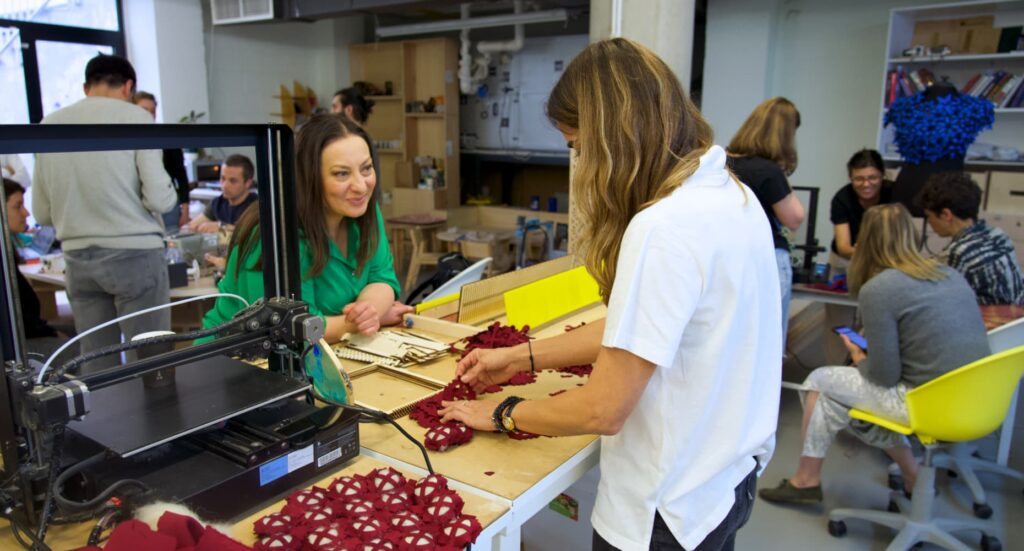
4. Exploring the Artistic Legacy of Gyumri
Fabricademy Bootcamp participants who came from all corners of the world were also offered an opportunity to discover Gyumri, the second largest city of Armenia, particularly rich in history and the arts. Gyumri is often described as the creative powerhouse and heart of Armenia.
Here, participants engaged in workshops at the Gyumri branch of the Fine Arts Academy, where they explored traditional textile printing techniques, such as cyanotype, lino printing, and batik. These sessions, led by local experts, demonstrated the already seamless integration of the heritage crafts with contemporary textile practices.
The Lentex Factory in Gyumri provided insights into Armenia’s modern textile industry. It highlighed the region’s industrial strength and its role in shaping the national textile innovation. Lentex was a vivid and positive model that features how to bridge traditional practices with contemporary innovation.
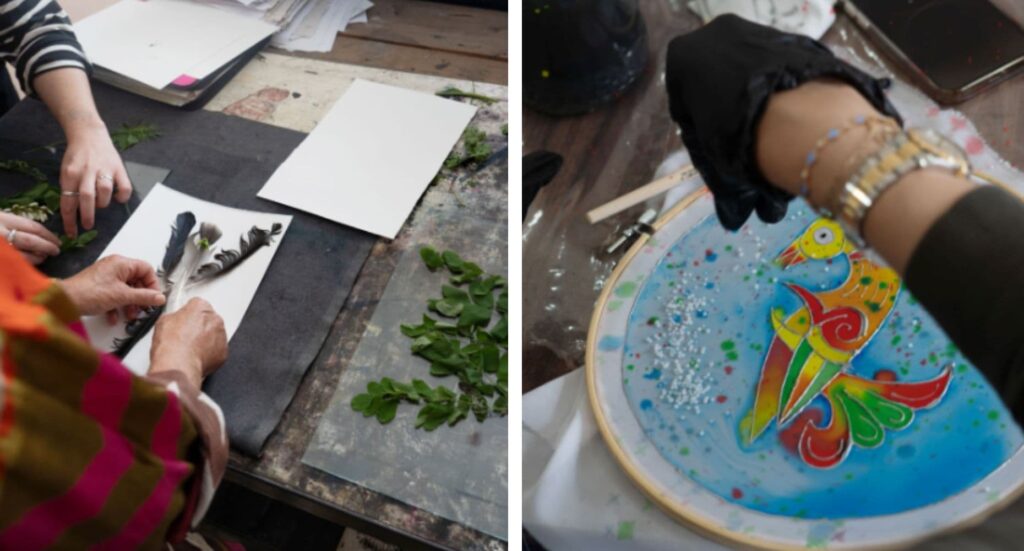
5. Celebrating Artistry and Tradition: Dancing Together, surrounded by Armenian Carpets and Living Stories.
We concluded our journey with a dinner at the Megherian Carpet Factory, and dancing amidst the ancient carpets adorning both the floors and walls. Participants immersed themselves in the profound history embodied by Armenian craftsmanship. This celebration concluded the Fabricademy Bootcamp and mark the beginning of a long, wonderful friendship and most of all the seeding of creative partnerships across the world.
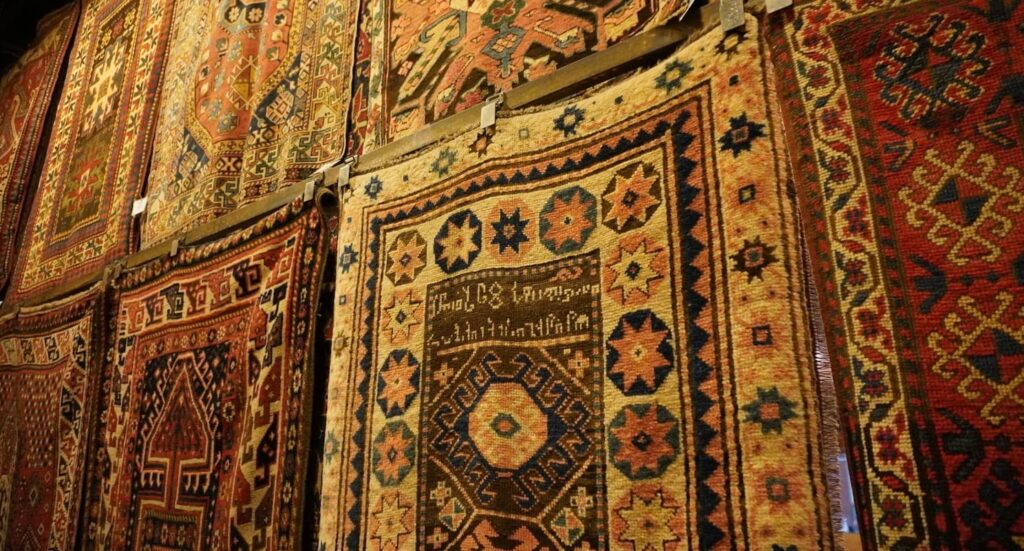
Fabricademy Bootcamp: Beyond Workshops and Lectures—The Art of Co-Creation
Design Globally, Produce Locally!
The Bootcamp went beyond traditional workshops and lectures to explore the essence of co-creation. It immersed participants in Armenian culture, showcasing a deep appreciation for creativity and demonstrating the transformative power of collaborative innovation. Participants experienced firsthand how classic and contemporary methods can coexist and enhance each other, advancing the fields of textile and digital fabrication.
Reflections on Learning, Machines, and Collaboration
The Fabricademy Bootcamp 2024 was a fertile ground for learning, offering invaluable and impactful lessons. Here are the key takeaways:
1. Blending Tradition with Innovation in Learning and Practices.
Participants appreciated their unique experience, which they described as a “cocktail of heritage and new technologies.” This approach allowed for discovery and innovation through the deconstructing of complex processes to make them accessible to everyone.
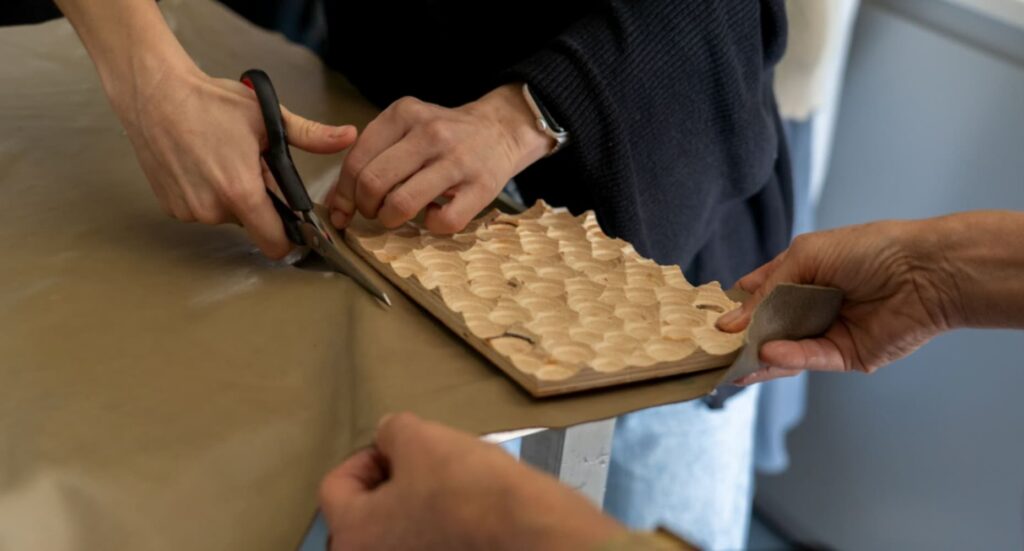
2. Technological and Tool Insights.
The Bootcamp ignited participants’ passion for integrating traditional practices with modern techniques by teaching them to use new digital technologies to design, do quick prototyping, and manufacture products. The potential of laser cutting and 3D printing on textiles was explored in such new ways that it opened new paths of creativity.
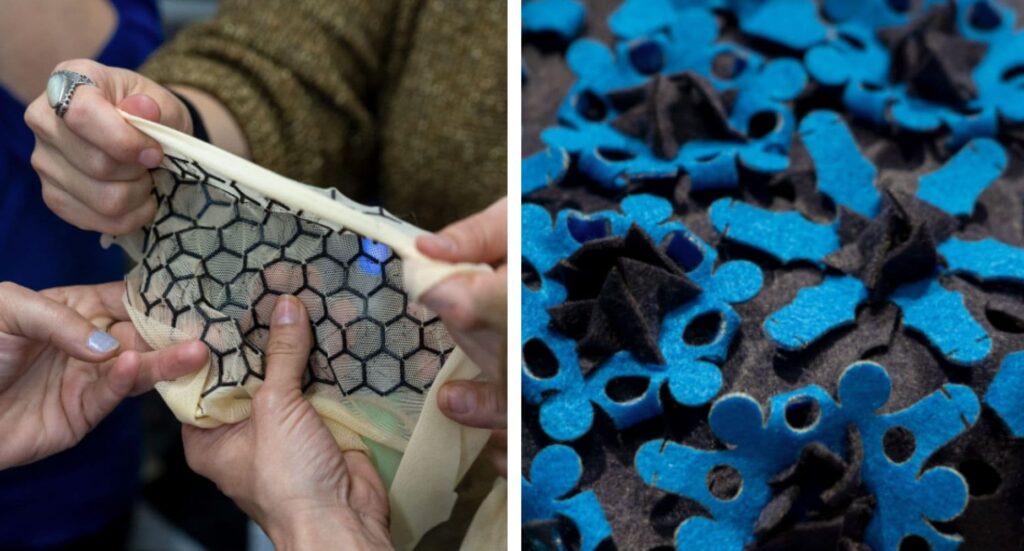
3. Rethinking the Role of Machines.
Participants rediscovered the potential of traditional machines like laser cutters, especially in crafting detailed products from materials such as leather. They also perceived machines as dynamic beings that keep evolving towards greater creativity in order to extend beyond computational control only.
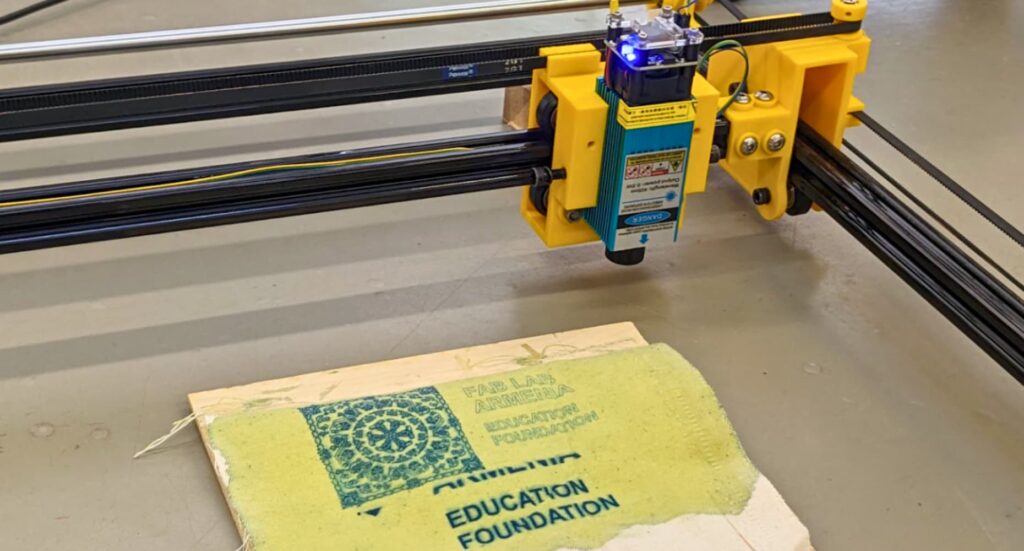
4. Building Bridges and Community.
The Bootcamp demonstrated a collaborative environment that transcended language barriers, showcasing the strength of collaboration and the value of diverse perspectives. It showed that by uniting tradition and innovation and fostering collaboration, we can pave the way for a sustainable and creative future in textiles.
Unveiling Projects and Future Horizons
Throughout the week, each day featured a rich array of projects by participants, all united by a theme of creative inventions. The exhibition showcased a diverse range of works, including biomaterials for sustainable fashion, e-textiles or programmable fabrics for wearable technology. The culmination was a collective presentation of all that was designed and produced, in a curated display space at AGBU Armenia, highlighting the seamless integration of traditional methods with cutting-edge digital technology advancements.
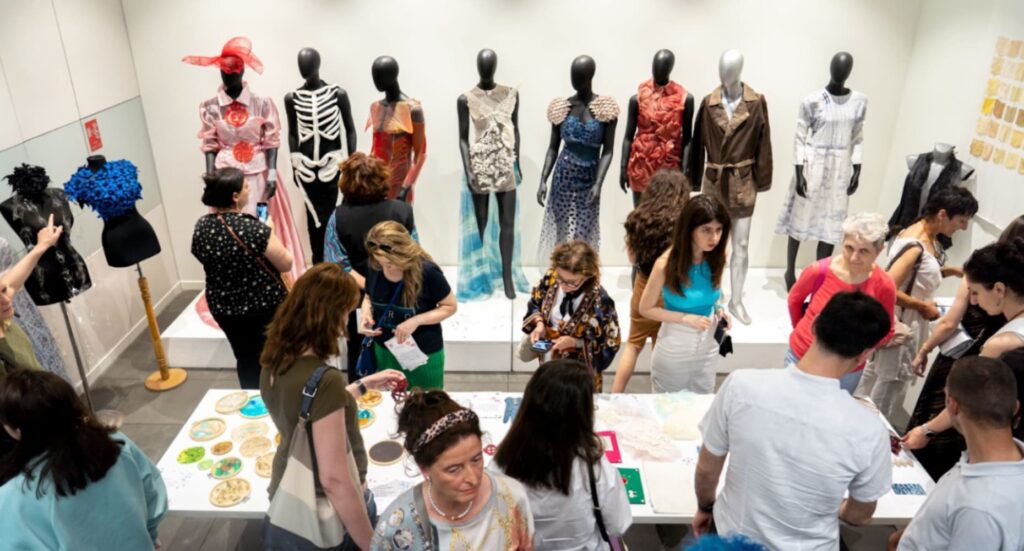
“Our approach offers a fresh perspective on culture and heritage. By immersing oneself in the country, it brings together generations, leverages skills, facilitates access to technology, and demystifies the complexities of science.”
— Anastasia Pistofidou, Co-Founder of Fabricademy & FabTextiles
Project Spotlight 1: G-love
A glove designed by Silvia Brandi, co-director of FarmLab.at, to send coded messages through touch. Four different circuits are embedded in the glove, each activated by touching the thumb to one of the other four fingers. Each circuit lights up a different LED color, conveying messages like “I need a coffee,” “I miss you,” “This is your turn,” or “I told you.” This project draws on the importance of non-verbal communication, especially gestures.
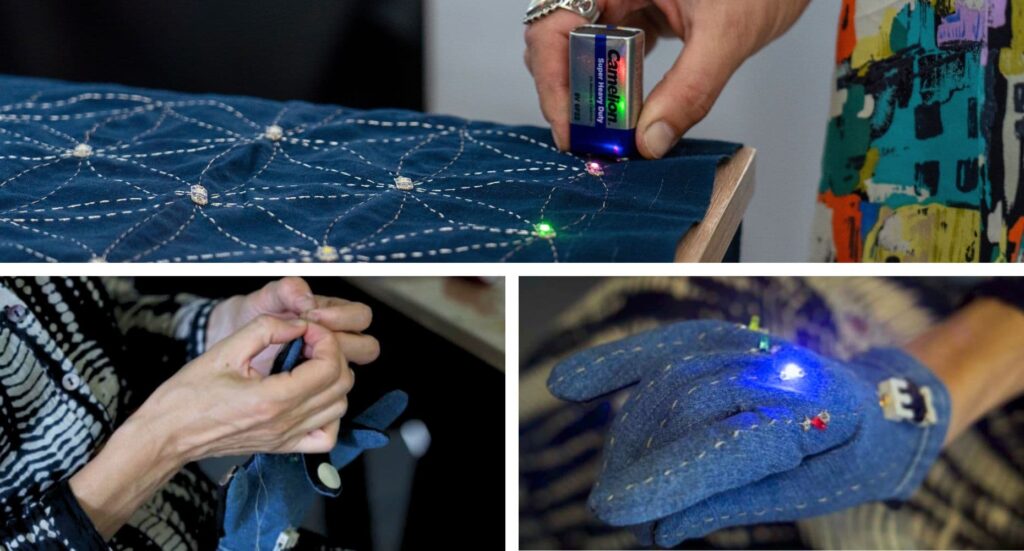
Project Spotlight 2: 3+1 Modular Creative Set, Inspired by Armenian Heritage Symbols
Tijana Vujosevic, Inspired by the elements of religious architecture by Artak Ghulyan, found in the Manoukian Manuscript Library at Holy Etchmiadzin, used CAD to create two basic modular shapes. The third shape was obtained by nesting to minimize fabric waste. Approximately 150 testing modules were laser cut from deep red-colored neoprene, paying tribute to the importance of the color of pomegranate in Armenian culture. These three modules can create infinite intricate and functional forms, as well as seamless fashion items.
The fourth element, sheep wool, addresses wool waste management and adds fullness and insulation to the objects created by the three modules. This Four Element “Lego” type set can be used to teach children basic mechanics while highlighting raw wool waste management and Armenian heritage symbolism creating various objects, including a pillow, lace, earrings, and a bracelet. A suggested further development is the replacement of neoprene with pomegranate peel bioplastic.
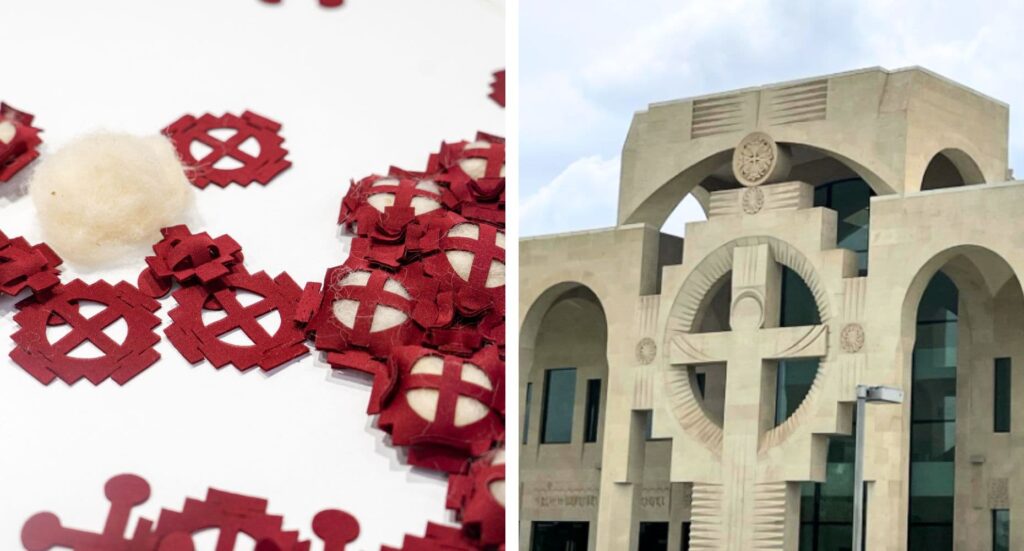
Project Spotlight 3: Symbols of the Fairy Tale
During the Bootcamp, Christina Avagyan collaborated with Angie Cohen on a project that integrated various artistic and technological techniques. Their project blended 3D modeling and printing on fabric, incorporated electronics and lights embedded within fabric, and utilized 2D modeling with laser cutting. This fusion resulted in a unique artistic experience that explored new possibilities in art and design.
Drawing inspiration from rich Armenian cultural symbols, Christina aimed to infuse her work with a deep sense of heritage and continuity. These symbols not only added historical and cultural significance but also provided a unique aesthetic that resonated with timeless elegance. Through this project, Christina and Angie explored the intersection of technology and creativity in art.
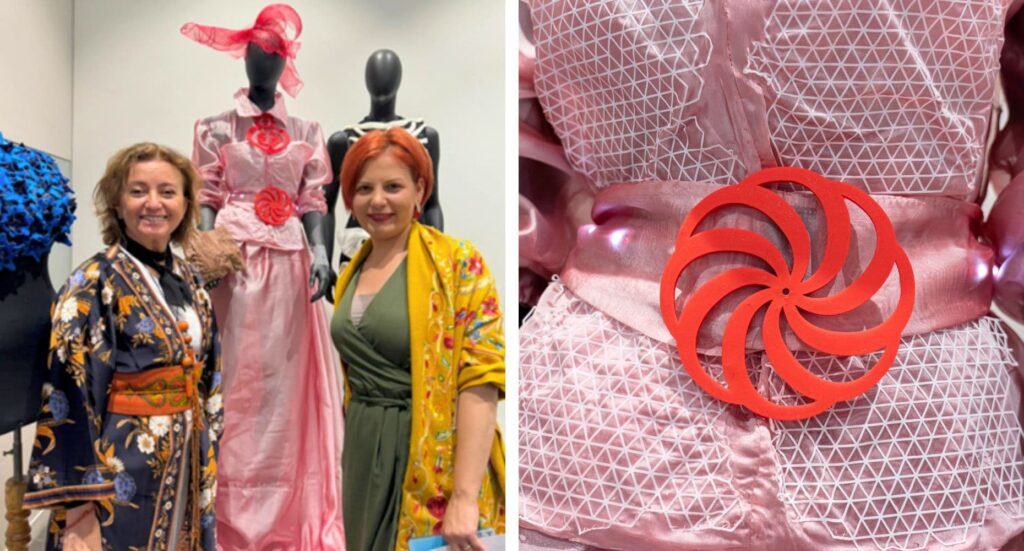
Looking Ahead!
A call for candidates for Fabricademy!
Fab Lab Armenia Education Foundation is now a node in the international network of the Fabricademy Program and welcomes applicants.
The Fabricademy Bootcamp has sparked excitement about enrolling in the 6-month Fabricademy program, which will start as early as September 2024.
The program is set to begin at the Dilijan-based Fab Lab Armenia Education Foundation. This six-month program provides an opportunity to dive deep into textile technology innovation. The course spans one semester and focuses on sustainable and digital textile design. The program also offers training in creative skills that will support Armenian arts.
Visit the Fabricademy website to learn more about the program, application process, deadlines, and more, or email us at [email protected].
Gratitude
Heartfelt thanks to all our partners and participants who made the Fabricademy Bootcamp Armenia 2024 a success. As we now look forward to the upcoming Fabricademy program, we take with us the lessons learned and friendships weaved.
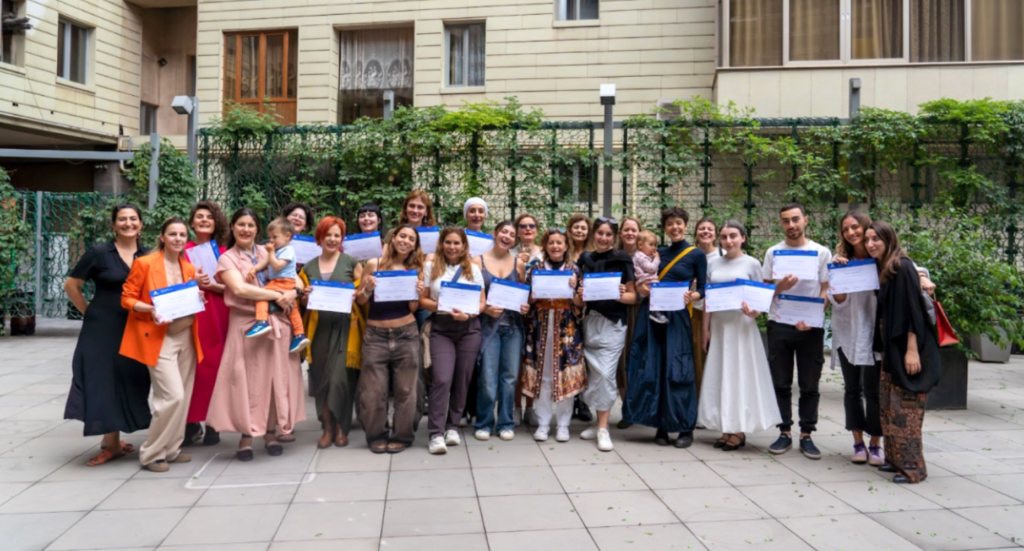
Let’s keep exploring, innovating, and creating together.
#FabricademyBootcamp #TextileInnovation #ETextiles #WearableTech #CreativeJourney
